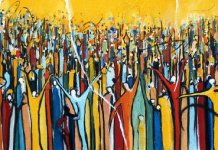The former Archbishop of Kenya has asked the government to come clean over the death of the former bishop of Eldoret, the Rt. Rev. Alexander Kipsang Muge.
Bishop Muge was murdered 29 years ago on orders of the government of President Daniel Arap Moi, a former member of Kenya’s Directorate of State Intelligence – the Special Branch – told the country’s Truth Justice & Reconciliation Commission in March 2011.
On 5 March 2012, Former Special Branch Inspector James Lando Khwatenge testified that the road accident in Busia that killed the outspoken bishop had been engineered by Special Branch to silence him, and to provide an example to political dissidents.
The murder was planned by the security services as “Operation Shika Msumari”, Inspector Khwatenge said. However, the acted on their own initiative to plan the murder he told the commission.
In the late 1980’s, Kenya’s Christian churches were in the vanguard of the campaign to end one party rule by the Kenya African National Union (KANU). The Church of the Province of Kenya in 1990 pressed the KANU government to amend the constitution and allow a multi-party political system, an independent judiciary, protection of tenure for the Attorney General and Auditor-General, a secret ballot for elections, and a limit on the tenure of office for the president to two five year terms.
The country’s churches backed the Anglican call for reform and in June 1990 urged President Moi to dissolve parliament, convene a national constitutional conference and hold free and fair elections. Large-scale political demonstrations erupted in July, which prompted a government crackdown, with the government detaining its most vocal critics, charging them with sedition.
In response, Bishop Alexander Muge of Eldoret and his colleague, Bishop John Okullu of Maseno South called for the president to step down and for fresh elections. On 12 Aug 1990, Labour Minister Peter Okondo warned Bishop Muge that if he and Bishop Okullu entered the Busia district “they will see fire and may not leave alive.”
Bishop Muge told the press the next day: “Let [Okondo] know that my innocent blood will haunt him forever and he will not be at peace for God does not approve murder.”
On 14 Aug 1990, Bishop Muge and his staff set out for Busia in the Diocese of Eldoret, when the car in which the bishop was travelling collided with a lorry. Bishop Muge was killed on impact.
Speaking earlier this month at a memorial service held at the Bishop Muge Chapel at St Matthews Cathedral in Eldoret, the Most Rev. Benjamin Nzimbi said
It was time the truth was told. “We remember Bishop Muge in a special way for mostly initiating many development projects within the Eldoret Diocese and the country as large,” the archbishop said, adding he was a “brave person” who was fearless in his pursuit of justice.
Alexander Muge “ would go ahead and tell the government on its face that it did wrong and that he would tell them to mend the broken ends it failed to achieve.”
“He gave suggestions on how we could overcome the prophecies he predicted, he was a God-given person to whom we referred to as the John Baptist,” the archbishop said.










